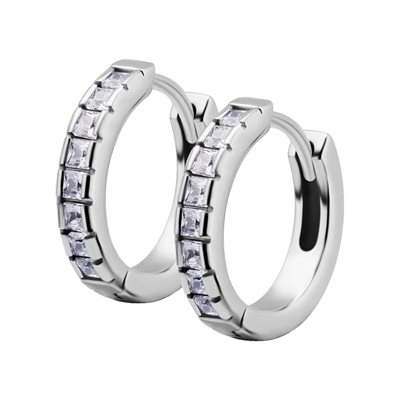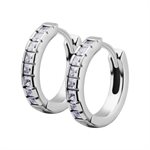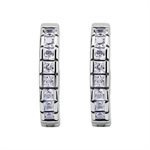- Homepage>
- Brands>
- Trinity Body Jewelry>
- Body Piercing Jewelry Catalog>
- Earrings, hoops and earstuds>
- Jewelled hoop earrings
Jewelled hoop earrings
Suggested Retail price: CAD $57.96
- Main material : Surgical Steel (316L-ASTM F138)
- Secondary material : None
- Classification : Earrings
- PVD Coating : None
- Gem type : Cubic zirconia and premium crystal
- Threading : None
- Availability: In stock
Surgical Steel 316
SS316L is a surgical implant grade, which is the most used material for Body Jewelry. The two most common standards that apply to body jewelry made of steel are ASTM F138 and ISO 5832-1 which describe the qualities of steel for surgical implants.
The element in stainless steel that causes allergic reactions in some people is nickel. Polishing the jewelry to a mirror like luster results in a protective layer of chromium oxide, which reduces the release of the Nickel content into the tissue. Surgical Steel can be sterilized in an autoclave.
Check certificate and nickel release certificate for more info. You can also check the latest European directive regarding the use of nickel for body Jewelry.
MAGNETISM IN SURGICAL STEEL 316L
We had some returning questions regarding magnetism in Surgical Steel 316L. Some people still believe that if the steel is magnetic then it is not surgical steel. We would like to emphasize here one more time that this is not true. Stainless Steel 316L is a low-carbon form of 316 steel. Although it is non-magnetic when produced, it may become magnetic when worked.
Cubic Zirconia
Cubic Zirconia is currently the most popular substitute to a diamond because to the untrained eye they look identical. Cubic Zirconia or CZ as it is referred to is made from zirconium dioxide a different material than diamonds, which although a different chemical composition comes closer than any other gem to matching the characteristics of a diamond.
Natural CZ was first discovered in 1899 but it wasn’t until the late 70’s that man-made CZ first came into production for use in jewelry.
CZ on first impression looks just like a diamond, but under close inspection there are differences, it has a gravity of between 5.6 and 6.0 which means it’s 1.6 times the weight of a diamond. It has a hardness of 8 on the Mohs scale, a refraction index of 2.176 and a dispersive power of 0.060, which means that it’s not as hard as a diamond; it’s slightly less sparkly but displays more prismatic fire which means more colour sparkles within the gem.
Another point to note is that natural diamonds display impurities which CZ doesn’t. It’s also clear in colour which most diamonds aren’t, but they can be coloured by adding metal oxides in the production process. Unlike diamonds, CZ are good thermal insulators which mean they become warm but can’t withstand the same kind of heat a diamond can, which is one test that is used to distinguish diamonds from CZ. Caring for CZ is important because they are more brittle than diamonds and susceptible to wear and tear such as chipping and scratches over time.
Premium Crystals
WHAT IS PREMIUM CRYSTAL?
Premium crystals are man-made gems manufactured in Austria. In 1892, Daniel Swarovski invented a machine for making precision-cut, beautiful, high-quality lead glass crystals using quartz, sand, and minerals. The exact proportions of these raw materials have remained a company secret. This specialized manufacturing process ensures the highest possible degree of precision which produces brilliant crystals. For five generations, the Swarovski family has continued the tradition of making the most recognized crystals in the world out of their factory in Wattens, Austria.
WHY ARE PREMIUM CRYSTALS MORE EXPENSIVE THAN GLASS?
The method of production and processing of raw resources are important factors in the quality of finished crystals. Swarovski uses only the finest materials to fashion faceted lead glass that is known around the world for its brilliance and value. Superior production, materials, cutting, and polishing are what set Premium crystals apart from other glass works. According to Swarovski, “Cutting hard materials such as crystal and gems, in such a way that they have a hundred identical facets in several directions, is a very complicated task; each direction of the reflected light must first be calculated by computer, then this has to be simulated in 3D, optimized and finally converted into control programs for complex machinery.”




